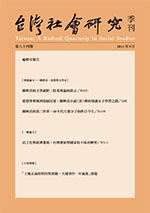
《台灣社會研究季刊》 第84期:

專題──陳映真:思想與文學Ⅱ
陳映真的文學視野:陰柔理論的啟示/戴盛柏(84民 100.09 頁 05-58)
若要探討整體社會問題,就不得不面對最根本的合理化問題,亦即人類生活世界的日常生活實踐為什麼是合理的問題。面對此問題, 必須具有社會理論的要求。只是社會理論的使用,並非借用任何現有理論架構來維持既定的社會發展模式,而是一種啟示性關係的運用,以面對未來社會的塑造。研究者經由理論的啟示,進入生活世界來對行動者加以瞭解,再回過頭重新形構既有的想法與觀念,如此方能真正問及日常生活世界中那些行動者們認為重要且相關的問題,也方能展望未來。因此,社會理論的運用關鍵在於啟發。
一位研究者可以從日常生活世界諸多面向中,汲取具啟發性的社會理論。不全然相同於學院領域所建立的理論,小說文本也具有建立一種理論啟示的可能。吾人針對台灣文學家陳映真的五篇小說作為探討依據,試圖從小說內容中進行初步的社會理論探索;即作為本文的核心問題──陳映真小說中基於女性、母性為出發點,在現代資本主義社會底下,是否具有建立一種陰柔理論的可能。文中首先以西方對於女性、母性為探討主軸的社會理論作為一種對比,突顯陳映真小說理論的特殊性、及其對於陰性理論發展的潛在優勢;其次針對陳映真小說進行陰柔理論探索,使得該理論的初步圖像能夠顯現。
透過陳映真小說所彰顯的社會理論啟示,在於行動者以「包容力」與「生活節奏」兩個概念相互作用所形成的動能機制,而能不斷進行連結、交織、浮現、萌生的生活節奏型塑過程,並從中獲得個人生活的意義與社會集體發展的意義。
關鍵字:陳映真、陰柔理論、凌駕父權、生活節奏、家、交織、包容力
Like political economics, sociology is used to treat society as a whole, and the most fundamental issue is about rationalization. Why the practice of human daily life is reasonable? Its' need approach of social theory to answer this question. The social theories have played an indirect role to enlighten the study of human behavior and daily life. For that reason, a researcher could build social theories from any dimensions of the world we live, even literature and fiction.
This article has tried to find a potential perspective of social theories from five short fictions of Chen Yingzhen, a famous writer in Taiwan. The main concern is the perspective about women and motherhood under the capitalist society in Chen's fictions. Is it possible to establish a Yin-Rou theory which is different from academic Western Feminism?
Through the revelation from the social theories revealed in Chen's fictions, an actor can make an agency from the conceptions of containing force and the rhythm of daily life, and obtain some meanings from the interaction between individual life and social collective development.
Keywords:Chen Yingzhen, yin rou theory, override patriarchy, the rhythm of everyday life, home, intertwine, containing force
從仰望聖城到復歸民眾:陳映真小說〈雲〉裡的知識分子學習之路/趙剛(84 民100.09 頁 59-135)
〈雲〉的核心是思考如何反抗當代的資本主義現代性。陳映真相信唯一的出路是第三世界的知識分子要在思想與實踐上重回故里,回到被壓迫被歧視被損害的民眾身上,從他(她)們身上重新學習。是在這個脈絡下,陳映真開展了日常生活的、人間的實踐倫理學,而將它展現在張維傑這個人物身上。透過張維傑,陳映真想要傳達的是一個核心的道理:第三世界的左翼知識分子要重新有一個理想主義的出發,就必須先找到一種建立在歷史縱深與日常生活之上的精神的「家」、「鄉」或「故里」,你不能也無法從一個「外在於」歷史傳統、社會現實與一般民眾的基點,進行理想主義的反抗。
關鍵字:陳映真、知識分子、民眾、美國、第三世界、工會、現實主義
Core to the novel The Cloud is how to resist the sweeping capitalist modernity often under an innocent facade of "American dream." In an age of "end of ideology," Chen Yingzhen provides a third-world perspective for our rethinking of the old issue. He insists that the intellectuals of the third world have no way but to build up a new idealism which is rooted in people's cultural tradition and daily life.
Keywords:Chen Yingzhen, intellectuals, people, America, the Third World, labor union, realism
陳映真的第三世界:50年代左翼分子的昨日今生/ 陳光興(84 民 100.09 頁 137-241)
本文透過細讀陳映真自1960年起至1994年,有關50年代左翼分子的五個重要文學文本,試圖追溯地下黨人及其家屬在當時投身社會主義運動與失敗後的精神風貌,並初步的勾勒那一代左翼分子的心靈史的結構。主要的發現是:陳映真在書寫中承繼了50年代左翼的思想情感,其重要性不僅僅在台灣內部搭起了與過去銜接的橋樑,同時連接回中國大陸、聯繫到第三世界,持續了社會主義世界革命的精神。要如何持續挖掘、搶救、研究、書寫台灣戰後左翼歷史,是學術思想界當前所面臨的挑戰。
關鍵字:陳映真、第三世界、左翼分子、精神狀況、50年代
This essay is an attempt to trace the historical trajectories of the life and/or afterlife of the leftists in the 1950s Taiwan, through close readings of five key texts of Chen Yingzhen's five novels, written from 1960 to 1994. The result is a preliminary picture of the structural configuration of the spiritual history of the leftists from that era. The major discovery is that through writing practices, Chen Yingzhen inherits the thought and sentiment of the 1950s generation. Its contribution goes far beyond bridging the crucial link between the past and present in Taiwan into establishing critical connections with mainland China and the Third Word, especially in the upholding the socialist spirit of the world revolution. How to continue to recover, rescue, research and writing the postwar leftist history in Taiwan is a real challenge to the critical intellectual circle of thought.
Keywords:Chen Yingzhen, Third World, leftist, mental conditions, 1950s
民主化與經濟發展:台灣發展型國家的不成功轉型/瞿宛文(84 民 100.09 頁 243-288)
在戰後,台灣及其他東亞國家依靠發展型國家模式而成功地發展了經濟。近年來東亞民主化帶來的變化,是否導致發展型國家模式的解體,是一眾所矚目的議題,而本文主題即是探討民主轉型對台灣發展型國家模式的影響。為了理解政治與經濟轉型的產生背景,本文先對台灣戰後發展型國家的形成與動力作一敘述,指陳國民政府在台灣推動經濟發展的政治意志,源自中國百多年來面對西方與日本挑戰,為了救亡圖存而形構成的現代中華民族主義。發展型國家的政策模式主要包括執政者對經濟發展的堅定支持,經濟官僚體系有能力且具鑲嵌自主性,以整體發展為目標,發展的優先性得在政策協調上顯現。而這些部分在近年則都受到民主化過程的影響。
從1980年代開始,台灣政治與經濟方面的轉型幾乎同時進行。本文將民主轉型對於經濟政策轉型的影響分幾方面討論:一是就政策目標之擴大以包容經濟發展以外之考量因素而言,發現民主轉型中社會議題之爭議趨向黨派化,使得社會對如何修正發展優先政策不易形成共識;二是就政策目標是否能持續以整體經濟發展為考量而言,發現民主競爭模式造成之分化及黨派化考量,對此帶來挑戰;三是討論主導性經濟理念的變化,發現民主運動對以往之全盤否定,也導致從以往之發展為先的理念轉變為以新自由主義為主導,無助於對全球化影響的因應;四則論及民主轉型中形成的主流論述,因強調台灣新國族的打造,未能處理台灣經濟重新定位的問題,也使得台灣經濟願景難以形成。雖說過去發展型國家模式確實應該且必須轉型,但至今轉型並非完全成功。
關鍵字:民主化,發展型國家之轉型,產業政策,民族主義,經濟發展
The East Asian tigers relied upon their developmental states (DSs) to achieve extraordinary economic development in the postwar era. Whether these DSs would remain effective after democratization occurred has been a subject of great interest. This paper addresses this question relating to the case of Taiwan. The formation and make-up of Taiwan's DS is discussed first from a historical perspective. It is argued here that the DS's will to develop came from modern Chinese nationalism, which had been formed during China's lengthy process of facing up to the challenge from the West since the Opium War. Taiwan's DS consists of the following features: the ruling elite's will to develop, a capable economic bureaucracy with embedded autonomy, an industrial policy framework with an aim of further overall growth, and an arrangement to coordinate policies to give development top priority. All these facets have been affected by the process of democratization in the last two decades.
By the 1980s, the success of Taiwan's development has brought great pressure for it to transform the original economic model and the political institutions at the same time. This paper discuss the impact of democratization on Taiwan's DS in four aspects: in terms of broadening policy objectives to include social concerns besides that of economic development, it is found that the fight over social issues have become too partisan for the society to form a policy consensus; as to whether the policy objective is furthering of overall interests, the new mode of political competition has sometimes led to pursuit of divisive and partisan ways of distributing resources; regarding the guiding principle of economic policy, neo-liberalism has replaced developmentalism as the guide because the democratic movement had adopted neo-liberalism in its fight against authoritarian rule; and finally, because the newly formed democracy discourse is mainly for forging an independent nation and against integration with Mainland China, it hence fails to provide a vision and a feasible future development plan for the Taiwan economy. In sum, the transformation of Taiwan's DS has been less than successful.
Keywords: democratization, transformation of developmental state, Industrial policy, nationalism, economic development
問題與討論
1960年代的陳映真:訪談淺井基文教授/陳光興(84 民 100.09 頁 289-307)
三鶯大橋的兩端/林麗雲(84 民 100.09 頁 309-318)
大國與小國的相互演進/崔元植(徐黎明、趙莉譯;白池雲校訂) (84 民 100.09 頁 319-333)
最後一堂課:2011上海陳映真文學研讀班總結心得/吳寶林 (84 民 100.09 頁 335-382)
跟上陳映真的回家路/張立本 (84 民 100.09 頁 383-396)
左異聲響
「土地正義的堅持與實踐:大埔事件一年過後」專題引言/蔡培慧(84 民 100.09 頁 397-401)
建構民主人權的土地政策/徐世榮、廖麗敏 (84 民 100.09 頁 403-429)
公民農業與社會重建/李丁讚 (84 民 100.09 頁 431-464)
重識、介入與結伴前行的反圈地路途/蔡培慧、許博任(84 民 100.09 頁 465-479)

